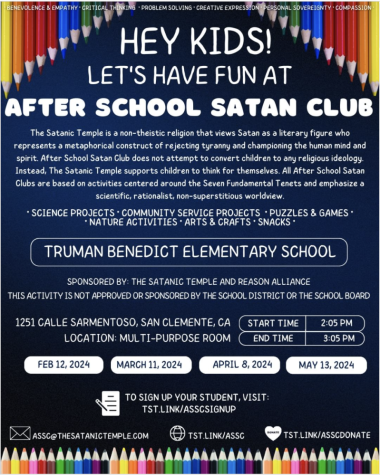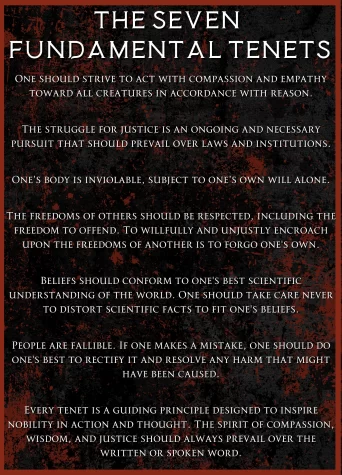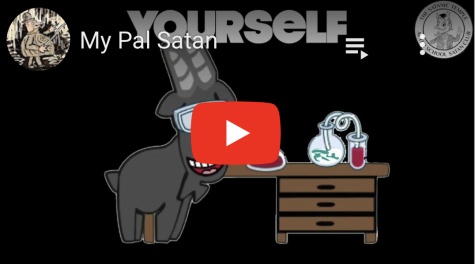
Nicolle Generaux | Editor-in-Chief
January 27, 2024
Is letting an After School Satan Club operate at an elementary school out-of-hand? Or should religious clubs just stay out of schools altogether? Or maybe all religious clubs should be allowed in schools, no matter how controversial they are?
In response to the Christian Good News Club being approved as an after-school club, Truman Benedict Elementary School recently sent out a brochure and a sign-up sheet for the After School Satan Club (ASSC). This new club is operated by The Satanic Temple, which was deemed a religion by the federal government in 2019. As explained further below, even though I may vehemently disagree with the tenets of the ASSC and question its motives, the issue is not whether it has a right to also be an elementary after-school program, but whether any religious clubs should even be allowed for such young children.
At first glance, the sheet and the after school Satan handbook from their website details the ASSC’s objective, “non religious” goals: to teach children to “think for themselves,” as well as “reject tyranny and champion the human mind and spirit,” and it has no intention of “convert[ting] children into any religious ideology,” but to expose them to a “scientific, rationalist, non-superstitious worldview.” However, on the ASSC’s website, it mentions that the club really strives to “provide a safe and inclusive alternative to the religious clubs that use threats of eternal damnation to convert school children to their belief system.” I may not agree with these tenets, but I agree with the ASSC’s right to say them within the confines of the law.
So, let’s start from the beginning. The Satanic Temple was founded in 2013 by two young men who opposed a bill that worked to help faith-based and community organizations to easily receive federal funding and grants. The founders are not shy as to why it was established. The Temple founded the ASSC in July of 2016 to directly oppose other after-school religious clubs around the country, in particular Good News Clubs (Christian and gospel-based clubs).
Gaining nation-wide attention, the Temple’s members and support grew exponentially, resulting in the Temple creating its own platform and set beliefs. Indeed, the Satanic Temple states it is entirely separate from the Church of Satan (which is negative in its connection to devil worshiping, dark magic, etc.), and it does not actually believe in the supernatural belief of Satan, but perceives him as rather a “literary figure that represents a metaphorical construct of rejecting tyranny over the human mind and spirit.” With this “scientific, rationalist, non-superstitious world view,” the Temple proudly advertises that it is politically active, “confront[ing] hate groups,” (particularly religious groups) and funding and supporting social issues like reproductive rights.
With that background, let’s explore the ASSC in a bit more detail.
First, let’s remember that the ASSC’s website states it will only open a club “if other religious groups are operating on campus” in order to provide an alternative to faith-based content, which “aim to indoctrinate children into their religious view.”
Isn’t this requirement rather odd? If the club’s only true desire was for the good of the children, why only establish a club when other religious groups are present, ensuring a tension and possible conflict between these clubs? It’s a bit of a red flag: the ASSC only follows where other religious clubs go, striving to draw a line between a so-called scientific viewpoint of the world and a religious one. As if one cannot coexist without the other. For a “religion” that claims to offer a neutral after-school program, that seems rather polarizing; not to mention that it seems grossly unfair to lump in every religious after-school club nationwide as “indoctrina[ting],” implying that the children need some sort of saving.

Further, the ASSC says they will not attempt to convert or teach children about their religion in its clubs, but is the ASSC not an extension of their religion? It states its after-school education programs are “centered around the seven fundamental tenets” of the Satanic Temple. For those who don’t know, individuals could find some of these tenets questionable; for example, the second tenet professes, “The struggle for justice is an ongoing and necessary pursuit that should prevail over laws and institutions,” potentially justifying any violent and illegal act for self-declared justice (e.g. the ends justify the means).
Is it not misleading to the public to state the ASSC does not indoctrinate children, but then admit their after-school activities are based upon these so-called religious tenets? Why not be up front that it’s teaching its tenets? Why not just admit that they desire to indirectly teach the children about the Satanic Temple?
Is it really the innocent, pro-science club it proffers, or is it mere camouflage for their anti-religious beliefs?
Finally, the ASSC asserts the importance of scientific and critical thinking, declaring it as the sole purpose for the existence of the club– and yet, the name of the club is the After School Satan Club. Why not call it a “critical thinking club” or an “atheist club”?
“If they aren’t going to teach about Satan, why is it called the satanist club?” questioned senior Natalia Briganti. “It’ll only confuse the kids.”
The ASSC says it uses Satan in the name because it is a “literary figure.” But couldn’t it also be because the image of Satan mocks the Christian faith? Isn’t everything about this club a parody? The Satanic Temple does not even believe in the existence of Satan, and yet they are willing to name their religion and their after-school clubs after it. Why? Is it only to get a reaction out of people or to aggravate Christians (and all religions for that matter) and directly oppose its teachings?
Another question – does the ASSC actually care about the education of the children in the after-school setting?
The Temple appears to be very proud that they are “scientific” and “rationalist” in their view of the world, and only seek for others to see through that lens as well. However, if it wants to teach that, could the Temple not rename or create a “critical thinking club” and establish it nationwide to ensure that children are encouraged to think scientifically and without bias? Surely a club with any name akin to this example would not stir up nearly the media frenzy or opposition it has at each and every school.

But maybe if the Temple had a name devoid of any religious reference it would not get the political or public attention it desires? It could not then promote club against club, religion against religion, parent against school board, even student against student. Surely a religion without a controversial name could not as easily mock traditional religions by insinuating that “scientific” and “rational” does not correlate with religion, and that the evil figures of the Christian faith are not actually evil?
Regardless of one’s feelings about the teachings and motivations of the ASSC, it argues that because it is a religion, the school board cannot deny its application to be an after-school program. This argument is based on the fact that the school boards appear to follow the secondary-school guidelines of California’s 1984 “Equal Access Act” which requires that no established religions (which now includes the Temple) can be rejected from a public school’s amenities.
Even though I strongly disagree with the ASSC’s and the Satanic Temple’s beliefs and hateful presence, ultimately I stand to allow the club to continue to be open to students after-school.
Why? Fundamentally, we should abide by the law, and because the federal government recognizes the Satanic Temple as a religion, we must treat it as such and allow it to have an after-school club (but not be part of any classroom teachings). Recall that for the ASSC and for the Temple, their primary goal is to strip religion from any public institution, as it “indoctrinates” people. However, to limit all points of view, including religious points of view, is contrary to the freedom of speech and the freedom of religious expression enshrined in the US Constitution. To remove this religious club from after-school programs, ALL religious clubs on campus must go– destroying the right to speak freely about one’s religion and to express that religion. To limit the ASSC would be to limit the speech of other religions– and at the end of the day, it’s not worth it. We can embrace others’ points of view, even if we don’t agree with it.
Understandably, many parents will object to the ASSC arguing that the children are just simply too young to be exposed to these kinds of extreme philosophical beliefs. The moral development of children, as described by the Kohlberg’s 6 Stages, does not even begin to transition from “bad behaviors=punishment” to “bad actions=evil” until at least the age of 9, leaving elementary school children open to influence by everything they see and hear (especially at school).
Nevertheless, for a child to attend the ASSC club, a parent signature is still required– so, ultimately, the parent is in charge of what their children are exposed to in after-school programs, and can easily refuse this invitation.
It all boils down to the issue of freedom of speech and the right to express one’s religion – and while we may not agree with it, we should be tolerant of and listen to other’s point of view – as long as parents are told about it and can consent to it.
“I would rather be exposed to the inconveniences attending too much liberty than those attending too small a degree of it.”
-Thomas Jefferson

fair